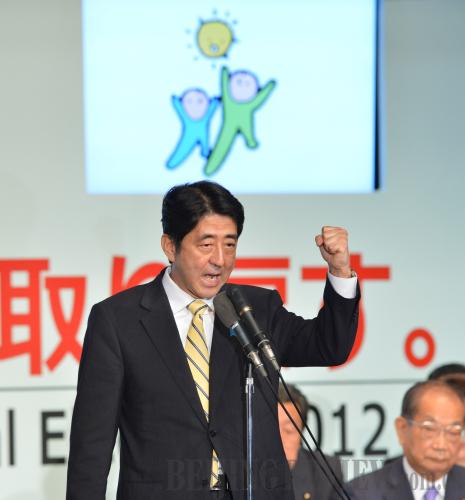|
 |
|
TOUGH TALK: Shinzo Abe, newly elected leader of Japan's main opposition Liberal Democratic Party, delivers his victory speech after the party's presidential election in Tokyo on September 26 (XINHUA/AFP) |
The incumbent Japanese Prime Minister Yoshihiko Noda retained leadership of the ruling Democratic Party of Japan (DPJ) in the latest DPJ presidential election in late September. Days later, after defeating four opponents, former Japanese Prime Minister Shinzo Abe was elected as the head of the main opposition Liberal Democratic Party (LDP).
Since the farcical "purchase" of China's Diaoyu Islands by the current Japanese administration, the risk of political instability in Japan has heightened. Soon after the election, Noda reshuffled his cabinet in an attempt to defend the DPJ administration. Meanwhile, Abe, a hawkish politician, is actively scheming to take advantage of the DPJ's current trouble for a second stint as prime minister in the next general election due within the year.
Observers said the instability of Japan's political situation in the near future could bring more uncertainty to the deadlocked Diaoyu Islands dispute. As Japanese politicians of both parties remain tough on the dispute, prospects for a smooth resolution are not optimistic.
"Whether the DPJ or the LDP takes power, Japan's policy over the islands won't change much," said Shi Yongming, a researcher with the China Institute of International Studies (CIIS).
Noda's "island-buying" move has made clear the DPJ's position on the Diaoyu Islands. Abe took a tougher stance over the dispute, threatening to establish a government agency over the islands after the so-called "purchase" and strengthen the power of the Japanese military if he becomes Japan's next head of government.
Opinion polls suggested that the LDP will come first in a lower house election expected within months. That would put its leader in place to become the next prime minister. A poll carried out by Japan's leading news agency Kyodo News put support for the LDP at 30.4 percent after Abe was chosen as its new leader, up 11.1 percentage points from September.
"Seen from the past, Abe focuses more on the alliance with Washington and Seoul. Easing relations with China is unlikely to be his priority if he takes office. The two countries could face new challenges," Shi said.
"It seems that the LDP is more radical over the issue, but it depends on its judgment over the situation and prediction of China's response. As I see it, if the situation worsens, the dispute would probably lead to conflict," Shi told Beijing Review.
Huo Jiangang, a researcher on Japanese studies with the China Institutes of Contemporary International Relations, claims that Abe's hardline stance on China is partly aimed at winning support in the election campaign.
To earn the support of conservatives, leaders of both parties resorted to heightening nationalism during the elections. Before taking office in 2006, Abe took a tough stance on China, but he became much more pragmatic when he took power, Huo said. China should attach less importance to what Abe said but more on what he will be able to do in the future, he added.
After the elections of party leaders, a series of personnel arrangements were made within both parties. Makiko Tanaka, former Japanese Foreign Minister, was tapped as education minister by Noda. The decision to bring Tanaka into the cabinet was reportedly aimed at repairing soured ties with China following the territorial row over the Diaoyu Islands.
Tanaka has personal connections with Chinese leaders through her late father, former Prime Minister Kakuei Tanaka, who spearheaded the normalization of diplomatic relations with China in 1972. When Makiko Tanaka was in Beijing as part of a cross-party Japanese parliamentary delegation on September 28, she pointed out that shelving the dispute over the Diaoyu Islands is the consensus among old generation leaders of both countries. This was also the public stance of the Japanese Government that was in power when the two countries normalized official ties.
Meanwhile, Masahiko Komura, Chairman of the Japanese parliament's Japan-China Friendship League, was appointed as vice head of the LDP by Abe. Komura is a former Japanese foreign minister as well as a sinophile. Abe said the appointment was intended to send a positive signal to China.
Shi, however, is skeptical about the new moves in Japan's personnel arrangements. "The two appointments are merely gestures, which do not equal substantial policy changes. As the influence of Tanaka and Komura is limited to their own parties, it is of little help for easing the tensions," Shi said.
Liu Jiangyong, a professor of international studies with Tsinghua University, echoed Shi's views. Liu said despite the recent personnel arrangements and diplomatic moves of the two parties, there will be no policy changes over the Diaoyu Islands issue from the Japanese side. However, both parties have noticed the severe impact of the issue on bilateral relations. It cannot be ruled out that Tokyo would reconstruct the Sino-Japanese relationship following the upcoming general election, he said.
| 